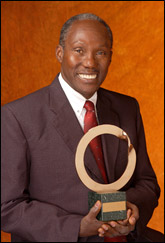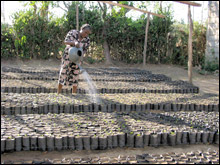
Chavannes Jean-Baptiste.
Photo: Goldman Environmental Prize.
Haiti, the poorest nation in the Western Hemisphere, faces overwhelming poverty. Massive deforestation has left its people vulnerable to deadly mudslides and floods, such as those that killed an estimated 3,000 people in late 2004, when tropical storm Jeanne swept through the area. The ouster of President Jean-Bertrand Aristide last spring was only the latest upheaval in this country’s long history of political violence, repression, and instability.
Yet Chavannes Jean-Baptiste, the founder of the Peasant Movement of Papay, has hope for the environment and people of Haiti. An agronomist, he has spent more than three decades training tens of thousands of farmers to use water-saving irrigation systems, natural fertilizers and pesticides, and simple erosion-prevention techniques. He’s also fought for legal and economic justice for rural Haitians.
Jean-Baptiste’s efforts have exacted a great personal cost: he has faced several assassination attempts, and was forced into exile from 1993 to 1994. But his work has also resulted in the planting of more than 20 million fruit and forest trees and, he says, fostered a strong sense of solidarity among the subsistence farmers in his area. “They’ve come to understand that together, they can change the way they live,” he says.
Jean-Baptiste was awarded a 2005 Goldman Environmental Prize at a ceremony in San Francisco on April 18. He spoke with Grist through a translator.
Tell me how you came to found the Peasant Movement of Papay.
I started my work in 1972. I was a Catholic lay worker, and as part of my training I had to find out how peasants in the region were doing agriculture. I began to learn from the peasants that their biggest problems weren’t technical — I thought from my education that that would be the case — but were more socioeconomic and cultural. So I had to rethink everything.
I began to read, and do a lot of research, and from this I began to discover my own way of educating. I began to realize that the peasantry had problems with divisions among themselves, and that they were extremely fatalistic, and that these problems and issues were holding them back. Little by little, I developed a method of education and organization. I started in 1973 with two small groups, and now we have a movement of 60,000 people.
How have you engaged so many people in your efforts?

Jean-Baptiste at the training center he runs in Papay, Haiti.
Photo: Ana Fuentes.
The secret is that I knew how to eliminate the divisions that separate people, and to create solidarity. The thing that weaves people together is solidarity around economic, social, and work issues. I also understood what their real interests and needs were. Their immediate need was for the production of food, and we realized that to assist with the production of food we had to create respect for the land, create security in land tenure, and protect the people from the rampages of the middleman. We had to look at all aspects of farm production.
So we began by addressing the immediate needs of the peasant, then moved into other areas. We fought for peasants to have justice in the courts, struggled with them against unfair taxation, and fought with them against the usury system — which sometimes charges people 300 percent interest per year. We now have a credit union, so peasants can borrow money without paying such high interest rates. The stocking of seeds for the future allows peasants to make a greater profit from production, and training in organic and sustainable farming has increased the capacity of farmers.
It’s these kinds of struggles, against all kinds of abuses, that have caused the peasants to come together in solidarity.
What do you think is your greatest success so far?

Thanks to Jean-Baptiste’s movement, sustainable farming is on the rise.
Photo: Jim Iacona.
The peasants now understand that they are the actors for change in their own lives. They’ve come to understand that together, they can change the way they live. They’ve come to understand that they can create their own destiny — that it’s not something created by someone else and imposed on them. There’s a Haitian proverb: “What man makes, he can remake.” People, human beings, have degraded the environment, and human beings need to repair it.
You currently chair the national council on peasant issues. Will this position help your work?
I joined this commission with great hope. But alas, those hopes have not been realized, as the new government does not truly have proposals to help the peasants. It’s possible that I am going to have to denounce this government, because they are fooling the people.
Of the many challenges facing the land and people of Haiti today, what do you consider to be the most pressing?
The destruction of the environment is the greatest problem facing Haiti today. At the time of Haiti’s independence [in 1804], it was 80 percent covered with forest. Today, less than 2 percent is forest. That situation is threatening daily life in Haiti, and you can see this in the terrible destruction caused by the flooding after [tropical storm Jeanne] last year. Agricultural production in the country has fallen to an extremely low level, and the peasantry is dependent on imported food, which plunges them into extreme poverty. Haiti now produces only 40 percent of the food we eat. In addition, we have the terrible problem of political instability. It’s difficult to make a list of priorities — we have to deal with these problems all at once.
What will this award mean for your work?
Because it is a prize for the environment, we will invest it in the environment. We will create programs for water management, and increase our efforts to produce more food and trees at the same time. We’ll develop more and distribute more natural pesticides and fertilizers, and invest part of the prize in different sources of alternative energy.

